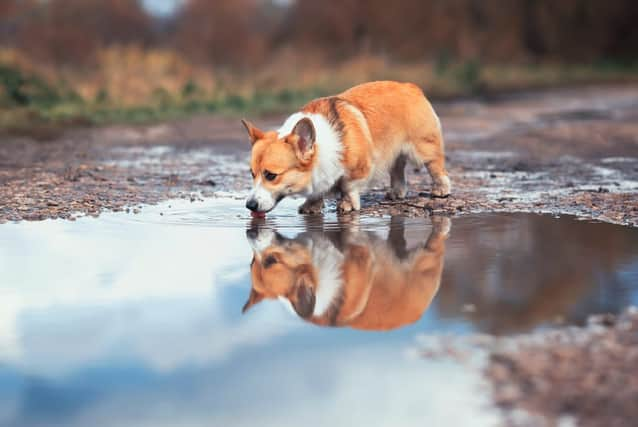Flood water, puddles and lakes could prompt fatal illnesses in dogs - what owners need to know


Vets and pet healthcare experts have urged dog owners to keep their pets away from flood waters, puddles, sewage and some lakes, due to them harbouring certain bugs which can cause severe illnesses.
One of these conditions is leptospirosis, which can cause weight loss, loss of appetite, bloody discharge from the nose, excessive diarrhoea, vomiting and increased urination.
Advertisement
Hide AdAdvertisement
Hide AdLeptospirosis is a bacterial disease that causes serious illness by damaging vital organs such as the liver and kidneys, said the People's Dispensary for Sick Animals (PDSA). Leptospirosis bacteria can spread in urine, and can enter the body through the mouth, nose or wounds.
Laura Campanella, Styling Director at GroomArts, and expert in pet healthcare and wellbeing, said: “It is very dangerous for dogs and cats to drink water from sewage, flooding, puddles or lakes because it can contain the urine or faeces from rats, which can carry an extremely infectious bacteria called Leptospira.
“I would urge all pet owners to be very careful of their dogs and cats around flooded waters and to make sure that they are not drinking out of puddles, ponds or on the road.”
If your dog is experiencing any of the above conditions, you should contact a vet immediately.
Advertisement
Hide AdAdvertisement
Hide AdHowever, the good news is that dogs can be vaccinated against the types of leptospirosis bacteria commonly found in the UK. You should contact your vet for more information.
‘Ingesting any water outdoors is certainly a potential risk factor’
Hemorrhagic gastroenteritis (HGE), is another condition which can also be serious in dogs, and which can cause vomiting and bloody diarrhea in dogs, as well as a painful abdomen, decreased appetite, fatigue or fever.
HGE occurs when fluid, protein and red blood cells leak into the gut, and if left untreated it can quickly lead to life-threatening dehydration, and in some cases septic shock. This is due to a dramatic drop in blood volume and the immune system becoming overwhelmed.
Peterborough dog owners are currently being warned to take extra care after a number of pets became ill following walks in the city and Nene Park issued a warning.
Advertisement
Hide AdAdvertisement
Hide AdA spokesman at Nene Park said: “We have recently been made aware of reports that hemorrhagic gastroenteritis has affected a number of dogs in the local area to the park.
“This condition, resulting in sickness and bloody diarrhoea, may be due to a waterborne bug, so owners may wish to take care that their dogs avoid playing in and drinking from puddles, rivers and lakes for the time being.”
Emergency vets at Vets Now treat six dogs a day, on average, for suspected hemorrhagic gastroenteritis across their network of out-of-hours clinics and 24/7 hospitals.
However, while the exact origins of all the causes of HGE is unknown, it’s believed that a proportion of the most serious cases are caused by a bacteria called clostridium perfringens, which is commonly found on raw meat and poultry.
Advertisement
Hide AdAdvertisement
Hide AdOther theories also include parasites and toxins to allergic reactions to food.
Vets Now has said that the number of cases it has seen of dogs with HGE has stayed relatively consistent over the past two years, so they are unable to say whether any of the recent cases of the conditions are linked directly to flood waters.
However, the veterinary service said that owners are being asked to keep a close eye on their pets for signs of the condition.
Professional standards director at Vets Now, Dr Playworth, said: “We’ve not seen any cases in our emergency clinics or hospitals that we can link directly to flood water but ingesting any water outdoors is certainly a potential risk factor.”
Advertisement
Hide AdAdvertisement
Hide Ad"And of course, there are specific risks with flood waters as the water could be contaminated with sewage, bacteria and parasites. You should always avoid letting your dog swim in flood waters, and avoid walking through contaminated areas,” she added.
“If they do come into contact, you need to rinse them down immediately. And be extra mindful of persistent vomiting and diarrhoea and to call your vets immediately. Take extra hygiene precautions for yourself by deep cleaning any mess areas and thorough handwashing.”
The prognosis for dogs with HGE is generally positive as long as they’re treated quickly, but it can be a life-threatening condition if left untreated, as it can quickly lead to hypoglycemia (low blood sugar), or hypovolemic shock, which occurs when a dog’s blood or fluid levels drop dramatically.
“You should contact your vet straight away if your dog or puppy is showing signs of the disease as it can be fatal,” Dr Playforth said.